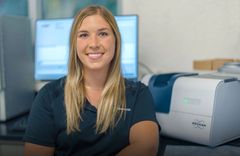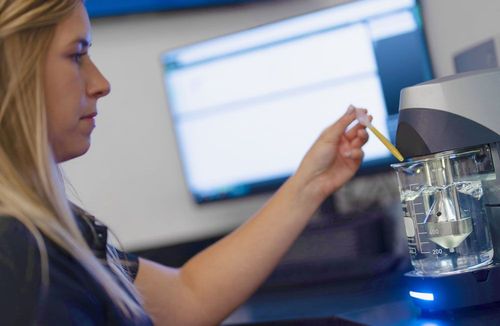Staying Up to the Test



a new Bruker NIR spectroscopy machine and a Mastersizer 3000 particle size analyzer are just two examples of new devices that have helped advance lab practices at Marquis. / PHOTO: MARQUIS ENERGY
September 12, 2023
BY Katie Schroeder
Q: How have ethanol plant lab practices changed, if at all, in the past few years?
A: We have noticed tighter regulations in lab practices as GMP+[certification] has become an important part of our process.
Q: Have your in-house staffing, technology or capability requirements changed in the past few years? If so, has that been related to increased or decreased reliance on third-party labs, other services, or changing operational priorities?
A: We have hired an Analytical Chemist/NIR [near infrared spectroscopy] Technician to develop reliable NIR methods that are frequently being monitored and updated. This has allowed us to get a better understanding of fat and protein throughout our plant and improved our ability to make real-time decisions without having to wait for third-party results to come back. We also invested in a protein analyzer to help us validate our methods without using a third-party lab for all of our samples. As new technologies have been implemented in our plant, it has prompted us to increase the testing that we perform, and we are also testing many more streams in the plant. For example, we are monitoring viscosity and particle size due to SGT [system], fat, protein, and solids throughout the plant—[as well as] thin stillage clarification and stressor testing on DEER streams.
Q: What are some new or evolved lab products, equipment, or technologies that have created notable improvements in your lab practices in recent years?
A: As mentioned above, our new Bruker NIR and the method development associated with it have advanced our lab practices. We also invested in a Mastersizer 3000 to monitor particle size, which has been a big help to our lab technicians since the manual method was very tedious.
Advertisement
Advertisement
Q: What is the biggest challenge you and your team have faced in the wake of the pandemic?
A: Supply availability and pricing. Since the pandemic, we have encountered many more supply backorders and shortages from our regular vendors as compared to before. With inflation, we have also seen a significant increase in pricing for many lab supplies. We have also faced issues getting technical representatives for instruments out quickly. It seems as if they got so behind on PMs and service during the pandemic that they are still struggling to catch back up.
Q: What are some of the innovations or improvements that you and your team have found helpful in your day-to-day work?
A: The use of DataParc has been and continues to be very helpful. We are continuing to learn new ways to utilize the program and it makes a big difference in the ease of looking at data. The ability to pull the tags from the DCS, as well as the manual data the lab techs and operators are inputting all in one Excel sheet, accelerates the data analysis process. We also use many dashboards through DataParc that allow us to get a quick snapshot of different areas of the plant, which is great. Having one program that holds all of our data is also helpful to our operators, so they do not have to navigate many different Excel sheets from various locations and remember where to find the information that is needed.
Advertisement
Advertisement
Q: What are some of the challenges your team faces in daily operations? How have you overcome those challenges?
A: Lab space has been a big challenge for us. As we continue to add new technologies to our plant, increased testing and lab equipment has come with that, along with more staff members. We have limited counter space and at times congestion in the lab. We have overcome that by getting creative with how we utilize our space and automating what we can to reduce the amount of unnecessary clipboards and binders we previously had. For example, all samples requiring testing or certification now have an automated check-in process through a tablet, so we no longer need binders and clipboards containing the information. Due to the size of our facility, the lab faces a high sample volume throughout the day. When running calibration checks, this limits the time available for fermentation samples, specifically on HPLCs. Fermentation samples need to be analyzed quickly, which presents a challenge when we have standards running on our HPLCs. This sometimes causes frustration among our operators since it prolongs the time it takes for their samples to run. Our lab team does a great job of communicating with process operators on sample times to make sure our instruments are calibrated regularly and accurately.
Q: Where do you see the most potential for improvement in the lab side of ethanol production?
A: I think there could be improvement opportunities for inline monitoring. This would be especially helpful in streams that are coming around to our front end to help notify us of any potential stressors that could impact fermentation.
Q: What is something that makes you excited about the future of your plant, or the industry as a whole?
A: I am excited to see how the industry changes as carbon capture and sustainable aviation fuel continue to become a bigger part of it. We have plans to move forward with both of these at our site, and it is exciting to see the industry move in that direction.
Printed in the 2023 October issue of Ethanol Producer Magazine
Related Stories
Saipem has been awarded an EPC contract by Enilive for the expansion of the company’s biorefinery in Porto Marghera, near Venice. The project will boost total nameplate capacity and enable the production of SAF.
Global digital shipbuilder Incat Crowther announced on June 11 the company has been commissioned by Los Angeles operator Catalina Express to design a new low-emission, renewable diesel-powered passenger ferry.
International Air Transport Association has announced the release of the Sustainable Aviation Fuel (SAF) Matchmaker platform, to facilitate SAF procurement between airlines and SAF producers by matching requests for SAF supply with offers.
Alfanar on June 20 officially opened its new office in London, further reaffirming its continued investment in the U.K. The company is developing Lighthouse Green Fuels, a U.K.-based SAF project that is expected to be complete in 2029.
ATR and French SAF aggregator ATOBA Energy on June 19 signed a memorandum of understanding (MOU) to explore ways to facilitate and accelerate sustainable aviation fuel (SAF) adoption for ATR operators.
Upcoming Events










